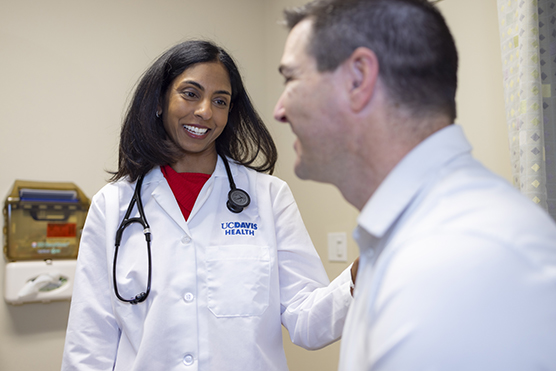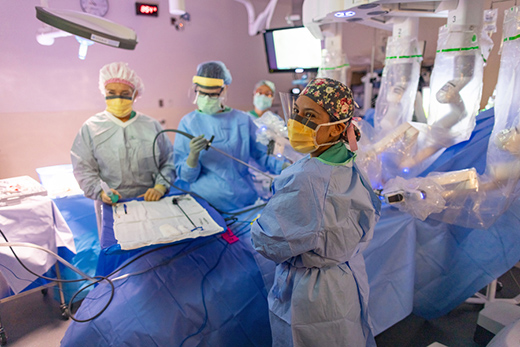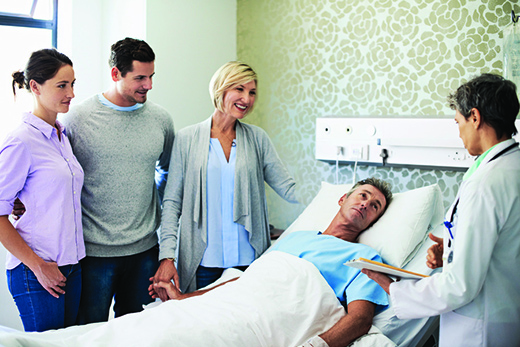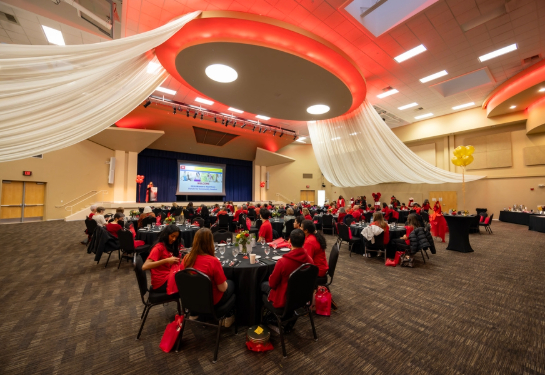Transcatheter Mitral Valve Replacement (TMVR)
You’ll receive expert care from our cardiology specialists. We perform more catheter-based heart procedures than any other medical center in the region.
Medically reviewed by Jason Rogers, M.D. on Oct. 02, 2023.

Pioneers in TMVR Replacement
Our world-renowned interventional cardiologists are among the few specialists in the country to offer the advanced Tendyne™ Mitral Valve System, which are only available through clinical trials.
UC Davis Health’s cardiac services include several minimally invasive catheter-based heart procedures like TMVR. These treatment options need only small incisions, so you’ll have a shorter recovery time.
What is TMVR?
TMVR treats mitral valve regurgitation, a condition that causes blood to flow back into your heart. At UC Davis Health, our cardiology team offers TMVR with the advanced Tendyne™ Mitral Valve System.
Minimally Invasive Transcatheter Mitral Valve Replacement
Transcatheter means we use a thin tube (catheter) to perform your heart valve replacement instead of traditional open-heart surgery.
Your provider will make a small incision in your chest during a TMVR procedure. They will guide a catheter to your heart and move your new valve through the catheter into your diseased mitral valve. When the new valve is in place, your specialist will expand it, and your mitral valve regurgitation will stop.
Request an Appointment
As Sacramento's No. 1 hospital, you'll benefit from unique advantages in primary care and specialty care. This includes prevention, diagnosis and treatment options from experts in 150 specialties.
Referring Physicians
To refer a patient, submit an electronic referral form or call.
800-4-UCDAVIS
Patients
Call to make an appointment.
Consumer Resource Center
800-2-UCDAVIS
Your provider will let you know which medications you should or should not take before your procedure. They will also tell you how long you’ll need to stop eating or drinking before you come to the hospital. Prepare to stay in the hospital for a day or longer and arrange for someone to drive you home.
-

Pre-Operation
At the hospital, we will set up intravenous (IV) therapy through a vein in your arm. We will deliver any fluids and medications you may need before, during, and after your procedure through this IV.
-

During Surgery
Your anesthesiologist will give you medicine to make you sleep during your procedure. You will not be awake or feel pain during the TMVR.
-

Post-Operation
You may recover in the intensive care unit (ICU) or a recovery room after your procedure. Many people return home the day after a transcatheter procedure. But keep in mind that you may need several weeks to recover fully.
Home Care
Your provider will give you specific home care and follow-up appointment instructions. During the first several days at home, be sure to:
Continue Your Breathing Exercises
These will help keep your lungs free of fluid and prevent possible complications.
Keep Your Incision Clean
Follow the instructions your provider gives you to keep your incision clean and help it heal. You can expect the wound to heal within 1 to 2 weeks.
Take All Medications as Prescribed
Your provider may prescribe medications to help your recovery. Take them as instructed.
When to Contact Your Specialist
Call your provider right away if you experience symptoms like bleeding, chest pain, dizziness or shortness of breath.

Ranked among the nation’s best hospitals
A U.S. News & World Report best hospital in cardiology, heart & vascular surgery, diabetes & endocrinology, ENT, geriatrics, neurology & neurosurgery, and pulmonology & lung surgery.

Ranked among the nation’s best children’s hospitals
U.S. News & World Report ranked UC Davis Children’s Hospital among the best in pediatric nephrology, orthopedics*, and pulmonology & lung surgery. (*Together with Shriners Children’s Northern California)

Ranked Sacramento’s #1 hospital
Ranked Sacramento’s #1 hospital by U.S. News, and high-performing in aortic valve surgery, back surgery (spinal fusion), COPD, colon cancer surgery, diabetes, gynecological cancer surgery, heart arrhythmia, heart failure, kidney failure, leukemia, lymphoma & myeloma, lung cancer surgery, pacemaker implantation, pneumonia, prostate cancer surgery, stroke, TAVR, cancer, orthopedics, gastroenterology & GI surgery, and urology.

The nation’s highest nursing honor
UC Davis Medical Center has received Magnet® recognition, the nation’s highest honor for nursing excellence.

World-class cancer care
One of ~59 U.S. cancer centers designated “comprehensive” by the National Cancer Institute.

A leader in health care equality
For the 13th consecutive year, UC Davis Medical Center has been recognized as an LGBTQ+ Healthcare Equality Leader by the educational arm of America’s largest civil rights organization.

